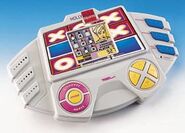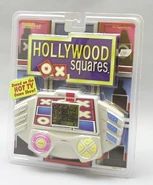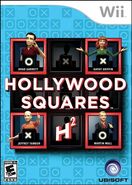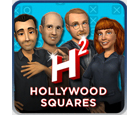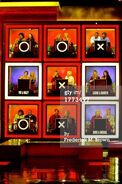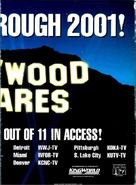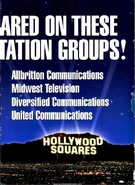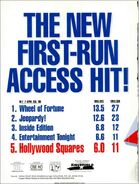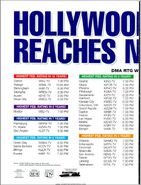| Aired | |
| Syndicated, September 14, 1998-June 4, 2004 | |
| Run time | |
| 30 Minutes | |
| Host | |
| Tom Bergeron | |
| Announcer | |
| Shadoe Stevens (1998-2002) Jeffrey Tambor (2002–2003) John Moschitta, Jr. (2003–2004) | |
| Origination | |
| Studio 33, CBS Television City, Los Angeles, California | |
This is chronicling the 1998 version of (The) Hollywood Squares. This version was also later known in its run as H² (a.k.a. H-squared) from 2002 until 2004.
Game Format[]
Although there have been variations over the years in the rules of and the prizes in the game, certain aspects of the game have remained fairly consistent.
Two contestants, almost always a woman playing Os/naughts (called circles in the show) and a man playing Xs/crosses, took turns picking a star and following the traditional tic-tac-toe/naughts-and-crosses strategies, for which square to select. The star was asked a question and gave an answer. The contestants had the choice of agreeing with the star or disagreeing if they thought the star was bluffing. If the contestant was right, he or she got the square; if the contestant was wrong, the other contestant got the square, unless that caused the opponent to get three in a row. In that case, the opponent had to win the square on his or her own. A contestant could also win by getting five "squares" on the game board, thus preventing draws.
On rare occasions, a star would not know the correct answer to a question, but would be unable to come up with a plausible bluff. In such instances, the contestant would be offered the chance to answer the question to win or lose the square as above. Usually the contestants declined, in which case they incurred no penalty and the same star was asked another question.
For most of the first five seasons, as well as for theme weeks in the sixth season, the first and second games were worth $1,000 to the winner. The third game was worth $2,000, and every subsequent game until time ran out was worth $4,000. If a contestant did not win anything in the main game, $500 was given to them as a consolation prize. In the early episodes of the first season, if a contestant could not win with five squares on the board, their opponent automatically got the remaining square and the five-square win. In addition, contestants only played for half the money; $500 was won for each of the first two games, with $1,000 for the third and $2,000 for all subsequent games and $250 was given as a consolation prize for failing to win a game. In addition, the consolation prize amount also was used for each contestant's square in the event that time ran out during a game, and was counted towards their cash total to determine the day's champion.
The tiebreaker was the same as the previous versions except that the contestant who has won the most games, most squares overall or won the last game played (whichever came first) had the option to play the question or pass it to his/her opponent, with a miss by either contestant giving their opponent the win by default.
For the first season two new contestants competed on each episode. Beginning in the second season, a contestant could stay on for a maximum of five days (or, in the final season, matches). The final season saw Hollywood Squares use a best two-of-three format; each game was worth $1,000, the first to win two advanced to the bonus round, and contestants were no longer given cash as a consolation prize for failing to win a game. The format changed resulted in episodes no longer being self-contained as they had been and instead having games that straddled episodes.
Secret Square[]
The first season also saw up to two Secret Square games. In the earliest episodes of the series, two Secret Square games were played on each show with a different prize offered for each game. The Secret Square was played in both the second and third games of the day, but after two weeks the Secret Square prize would only carry over to the third game if neither contestant had claimed in it the second game. From the second season forward, the Secret Square would only be played for in the second game.
Beginning in the second season and continuing until the end of the fifth season, the Secret Square game was played for an accumulating jackpot of prizes that Tom Bergeron referred to as "The Secret Square Stash". A new prize would be added to the jackpot each day until someone claimed it, with the highest ever Secret Square totaling $50,731 in prizes. For the last season, the Secret Square game returned to offering a different prize in each game, regardless of whether or not the previous prize had been won.
Endgames[]
"Pick a Star and Win a Prize"[]
Each of the nine squares hid a different prize, with $10,000 ($15,000 in Season 3) and a car being the two most expensive. The day's winner simply picked the celebrity they wanted, and won whatever prize was in an envelope that star was holding.
Beginning partway through the first season and continuing until partway through season four, the round was modified to where in order to claim the prize, the champion had to correctly agree or disagree with a Secret Square-style question posed by Bergeron to the chosen celebrity. For the first season, if a contestant did not do so he/she was awarded $2,500 as a consolation prize. Once returning champions were reinstated beginning in the second season, no consolation prize was given to a champion for missing the question. However, for the show's recurring theme weeks where contestants only played for one day, the $2,500 was given for a miss.
Big Money Round[]
Beginning approximately two months into Season 4 and continuing until the end of that season in June 2002, Hollywood Squares instituted a new high-stakes round in response to the recent trend of quiz shows offering big cash prizes.
The champion faced a general knowledge trivia round with their choice of any of the nine celebrities. Again, each of the celebrities held envelopes with varying dollar amounts hidden inside, ranging from $1,000 to $5,000 (increments of $500). If the champion picked a square that contained more than one person, they would have to pick only one person from that square. The champion was given 60 seconds to answer up to ten general knowledge questions; they were allowed to consult their celebrity partner for help, however, only the champion's answers counted. Each correct answer was worth the amount in the envelope, which was revealed at the start of the round.
At the end of the sixty seconds, the champion was given a choice to either quit with the money earned in the round or attempt to go double-or-nothing on an open-ended final question, with the category given to the contestant before he/she made the decision to play on. The top prize in the Big Money Round was $100,000, with the most won by a contestant in the round being $60,000.
Key Bonus Round[]
Nine keys were shown, only one of which would win the day's prize. To eliminate the bad keys, contestants had 30 seconds to select celebrities and correctly agree or disagree with statements about the celebrities read by Bergeron. The clock started after the contestant selected the first star.
For each correct response, one of the bad keys was eliminated from the grid of nine. If the champion had made multiple unsuccessful attempts to win the same prize, one free key will be removed for each attempt. During theme weeks, in which two new contestants played each day, one extra key was removed since the champion plays only once for the prize. After the bad keys were removed, the champion chose the one key they thought would win the prize. If unsuccessful, the champion received $1,000 for each correct answer they had given in the first half of the round.
The prize structure was as follows:
- 1st win: Car
- 2nd: $25,000 cash
- 3rd: Trip around the world or a luxury vacation (worth between $20,000–$30,000)
- 4th: $50,000 cash
- 5th: $100,000 cash
To win the car, the chosen key had to start its engine. The cash prizes required the contestant to unlock a safe with the correct key, while a steamer trunk had to be unlocked in order to win the trip.
On occasion, the second prize was substituted for a gift certificate in that amount to an upscale store; these were often used as bonus prizes during special weeks or tournaments. For special weeks, the bonus round plays for either $25,000 cash for charity, or a car during non-celebrity theme weeks.
For the final season the prize structure was changed again:
- 1st win: Vacation (worth over $10,000)
- 2nd: $10,000 cash
- 3rd: Luxury car (worth over $40,000)
- 4th: $25,000 cash
- 5th: Trip around the world
In addition, champions started with nine keys for each attempt at winning a bonus prize regardless of how many times the prize had not been won, and the consolation prize reduced to $500 for each square captured in the true-false round. For season 6 theme weeks, the rules in the previous season were used, with winners playing for $10,000 cash or a car.
Tournaments[]
Tournament of Champions[]
Starting in Season 2, the show began having an annual Tournament of Champions each May, with the season's biggest winners returning to compete for additional cash and prizes. The format changed each season:
Season 2: Six five-game winners came back to play again. Play was as normal, except the Secret Square was worth $2,500, which was added to the score. The bonus game was also played for cash, from $5,000 to $15,000. The two contestants who earned the most money came back for a two-game final, playing by the same rules as the semi-finals. In addition to the other cash won, the champion won an extra $50,000. The final bonus round was worth up to $15,000.
Seasons 3 & 4: Eight four-game winners compete in a semi-final game. The two top winners return on Friday. The Secret Square prize was an actual prize, again added to the final score, but was the same each day so no one has an advantage. The champion won $25,000 and the trophy, and a Jaguar was among the prizes in the bonus game. Season 4's tournament was similar to that of the previous year, except that the bonus game winnings were taken into account. The final grand champion won a Mercedes-Benz in addition to the money.
Season 5: Season 5 had a "Close but No Cigar" week to decide who would join the seven undefeated winners in the normal tournament. The bonus round was played for a $25,000 Bloomingdale's shopping spree until Friday, when it was replaced by a cruise on the RMS Queen Elizabeth 2. The winner of the tournament chose one of the celebrities who then revealed a cash amount of up to $50,000 inside a sealed envelope.
Season 6: The winner of the tournament played the standard bonus round and chose one of the captured celebrities, one of whom was holding an envelope with up to $100,000 in it.
College Championship[]
Each year from Seasons 2 to 5 had 14 college students competing. Seven quarter-final games were played. The four contestants with the highest overall totals move on to the semi-finals. The two winners played in the final game, where the winner won a $25,000 savings bond (later a car), as well as a trophy for their university. Secret Square and bonus round prizes were added to the totals to determine who moved on.
In 2001, Goldberg was not present during some tournament shows, having Caroline Rhea & other celebrity guests taking over center square. In the Finals, Martin Short (in character as Jiminy Glick) took over center square.
In Season 5, the bonus round was played for $25,000 (savings bonds in the quarter-finals, cash in the semi-finals), and the grand champion automatically won a new Jeep Wrangler.
| This page uses Creative Commons Licensed content from Wikipedia (view authors). |
End-of-Show Disclaimers[]
"Contestants are briefed that some celebrities will be provided answers and possible bluff responses prior to taping. In addition, some celebrities may have access to all of the game material." - (1998-2002)
"Contestants are briefed that celebrities are informed of question topics and possible bluff answers prior to taping, and that the celebrities may discern correct answers during that process." - (2002-2004)
Trivia[]
On October 1, 1999, a well-known happening occurred in which Gilbert Gottfried said "YOU FOOL!" after the contestants missed six consecutive tries on their decision whether they agreed or disagreed. The seventh time, Gottfried and the contestant agreed, finally winning the square and the game.
Merchandise[]
(1998-2002 era)[]
Board Game[]
Handheld Game[]
(2002-2004 era)[]
Video Games[]
Computer Game[]
GSN Interactive versions of Tom Bergeron's Hollywood Squares.
Cancelled Merchandise[]
Hasbro Interactive was going to release a CD-ROM based on the 1998 version for the PC and Sony Playstation in 1999, but it was cancelled during development.
A video game based on the 1998 version was planned for the Nintendo Game Boy Color by Majesco Entertainment in 2000, but the game got cancelled due to the poor sales of Majesco's earlier titles and licensing issues with Hasbro.
In 2010 and 2011, Ludia and Ubisoft released video games based on the 1998 version, using the 2002-04 format, for the PC, Nintendo Wii, iPhone, iPad, iPod Touch and Playstation 3's PSN and had planned to release a version for the Nintendo DS, but it never made it onto store shelves.
Photos[]
H2 Logo[]
TV Screens[]
Whoopi Gallery[]
Trade Ads[]
Stations[]
Stations that aired this included:
New York - WCBS
Los Angeles - KCBS, KCAL
Chicago - WBBM
Philadelphia - KYW
Detroit - WWJ
Minneapolis/St. Paul - WFTC
Milwaukee - WISN
Seattle - KING
Cincinatti - WLWT
Cleveland - WEWS
Toledo - WTVG
Marquette, MI - WBKP
Grand Rapids - WZZM
San Francisco - KPIX
Boston - WBZ
Green Bay / Appleton - WGBA
Madison - WMTV
Wausau - WAOW
La Crosse/Eau Claire - WEAU
Duluth/Superior - WDIO
Rochester/Mason City - KAAL
Des Moines - WHO
Washington, DC - WJLA
Denver - KCNC
Miami - WFOR
Pittsburgh - KDKA
Baltimore - WBAL
Hartford - WFSB
Providence - WJAR
Phoenix - KPHO
Kansas City - KMBC
Salt Lake City - KUTV
Harrisburg - WHTM
Jacksonville - WBSG
Little Rock - KATV
Tulsa - KTUL
Charleston, SC - WCIV
Watertown, NY - WWNY
Sacramento - KXTV
St. Louis - KMOV
Orlando - WKMG
Portland, OR - KGW
Indianapolis - WRTV
San Diego - KFMB
Charlotte - WCCB
Nashville - WXUP
Columbus, OH - WSYX
Houston - KHOU
San Antonio - KENS
New Orleans - WWL
Raleigh - WRAL
Birmingham - WIAT
Memphis - WREG
Austin - KEYE
Sioux City - KMEG
Ft. Myers - WZVN
San Angelo - KLST
Santa Barbara - KCOY
Billings - KULR
Eureka - KAEF
Dayton - WKEF
Las Vegas - KVBC
Mobile - WEAR
Bangor, ME - WABI
Fresno - KFSN
Harlingen - KGBT
Greenville, SC - WSPA
Lansing - WLNS
Tallahassee - WTXL
Wilkes Barre - WNEP
Knoxville - WVLT
Chattanooga - WRCB
Jackson, MS - WAPT
Youngstown - WKBN
Tyler, TX - KETK
Reno - KTVN
Augusta, GA - WJBF
Fargo - KVLY
Bakersfield - KBAK
Erie - WICU
Idaho Falls - KPVI
Zanesville - WHIZ
Sioux Falls - KELO
Cedar Rapids - KWWL
Panama City - WJHG
Rochester, NY - WOKR
Tucson - KVOA
Yakima - KIMA
Kennewick - KEPR
Dallas - WFAA
Oklahoma City - KFOR
South Bend - WSBT
Flint - WNEM
Bismarck - KFYR
Minot - KMOT
Lima, OH - WLIO
Eugene - KEZI
Hattiesburg, MS - WDAM
Grand Junction - KKCO
Lincoln, NE - KLKN
Macon, GA - WPGA
Portland, ME - WCSH
Bowling Green - WBKO
Charleston, WV - WCHS/WVAH
Episode Status[]
See Also[]
The Hollywood Squares
Storybook Squares
The Match Game-Hollywood Squares Hour
Hollywood Squares (1986)
Hollywood Squares (1992 proposed revival)
Planet Hollywood Squares
Hollywood Squares (2015 proposed revival)
Hip Hop Squares
Hip Hop Squares (2017)
Nashville Squares
Celebrity Squares
Video[]
Links[]
Official Website (via Internet Archive)
Official Website/2000 era(via Internet Archive)
Official Website/2002 era (via Internet Archive)
Secret Squares Sweepstakes (via Internet Archive)
Hollywood Squares (Bergeron) program description by Game Show Network
Hollywood Squares by Tiger Electronics









